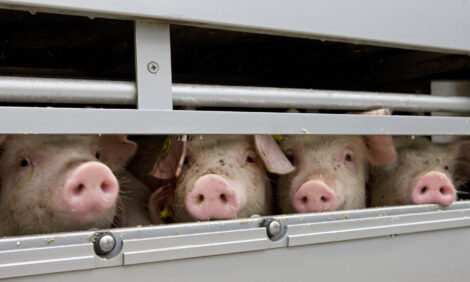



Non-GMO Pork in Germany
US - The German retail chain Edeka-Nord started a non-GMO pork program in July 2003. Through this program, Edeka intends to intensively communicate that its pork has been produced without GMO feeds.Summary
The German retail chain Edeka-Nord started a non-GMO pork program in July 2003. Through this program, Edeka intends to intensively communicate that its Gutfleisch brand pork has been produced without GMO feeds. Total volume for the first year is expected at 120,000 hogs with the intention to double the program in 2004 to 250,000 hogs.
This week, mid-July, Edeka-Nord, one of the big German retail chains announced the start of pork sales without GMOs. Present at the Edeka press conference was the German Federal AgMinister Renate Kuenast, a known supporter of GMO-free agricultural production. Edeka has contracted hog producers in northern Germany to produce about 120,000 hogs without GMO feeds.
The pork will be sold under the Gutfleisch-label, a premium price meat program which has already existed for many years. Among other criteria Gutfleisch guarantees that their meat comes from animals which were not treated with growth enhancers; all Gutfleisch meat is free of antibiotics; antibiotic treated animals will be excluded from the program. Actually, Edeka-Nord was the first retail chain in 2000 to run an intensive BSE test program. With the help of the Edeka BSE testing program the first official German BSE cow was discovered in November 2000.
We were told that the protein meal for feeding these 120,000 hogs will originate from soybeans grown in northern Brazil. According to the Press person of Edeka-Nord, Edeka and their trading partner Bunge apply a hard IP program guaranteeing that the beans come from conventional varieties. The beans will be shipped to Hamburg and crushed at the oil mill Hamburg, an ADM subsidiary. Edeka and the contracted hog farmers guarantee that the feeds meet legal European standards for non-GMO products. This explicitly does not mean that the soybean meal will be 100 percent free of GMOs, but it will not exceed the expected EU threshold of 0.9 percent. Cooperations partner to Edeka in the supervision progam is Greenpeace Germany.
For the 120,000 hogs, a maximum of about 10,000 tons of non-GMO soybean meal is required. Edeka argues that the production cost of the pork will rise by one Euro cent per kilogram. Edeka claims that they do not pay a premium for the non-GMO beans in Brazil. However, they have promised their partner farmers in Germany to increase the hog prices if feed prices do go up. Edeka would prefer to use domestically grown protein crops as protein source in its feed formula; this however, would currently increase the pork production cost by 30 Euro cents per kilogram. Edeka claims the retail price for the non-GMO pork will not be increased. Edeka intends to extensively communicate the non-GMO pork program in media and at point of sale.
For 2004, Edeka plans to convert its complete Gutfleisch pork program to non-GMO pork, increasing purchases of non-GMO hogs to about 250,000 head annually.
Source: USDA, FAS - Global Agriculture Information Network - 18th July 2003








